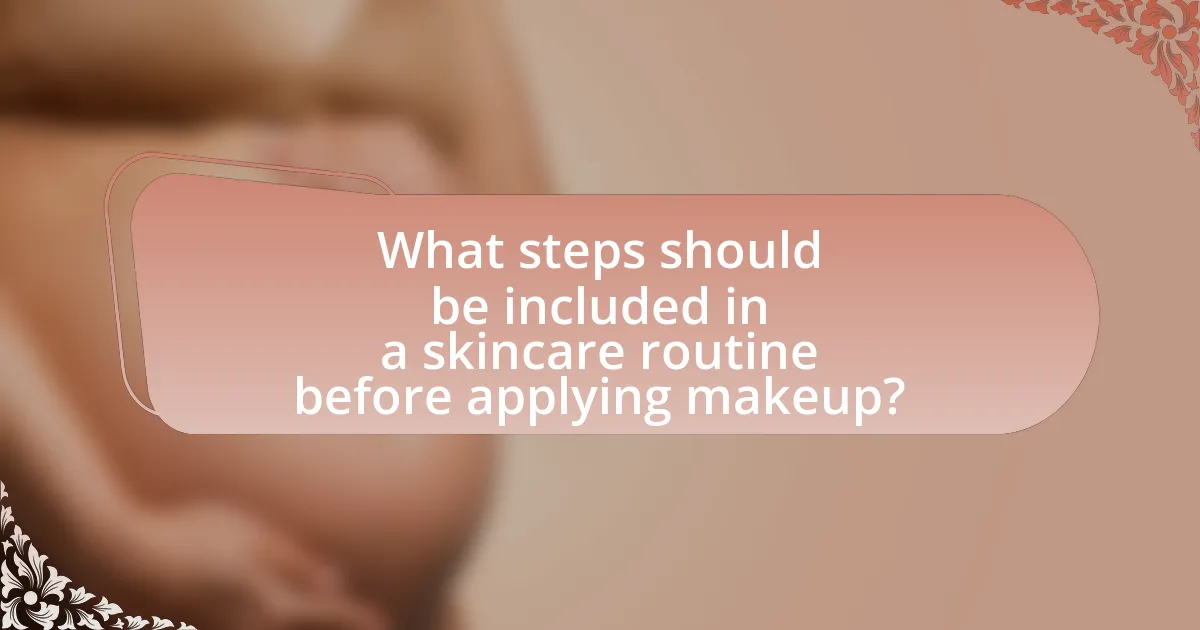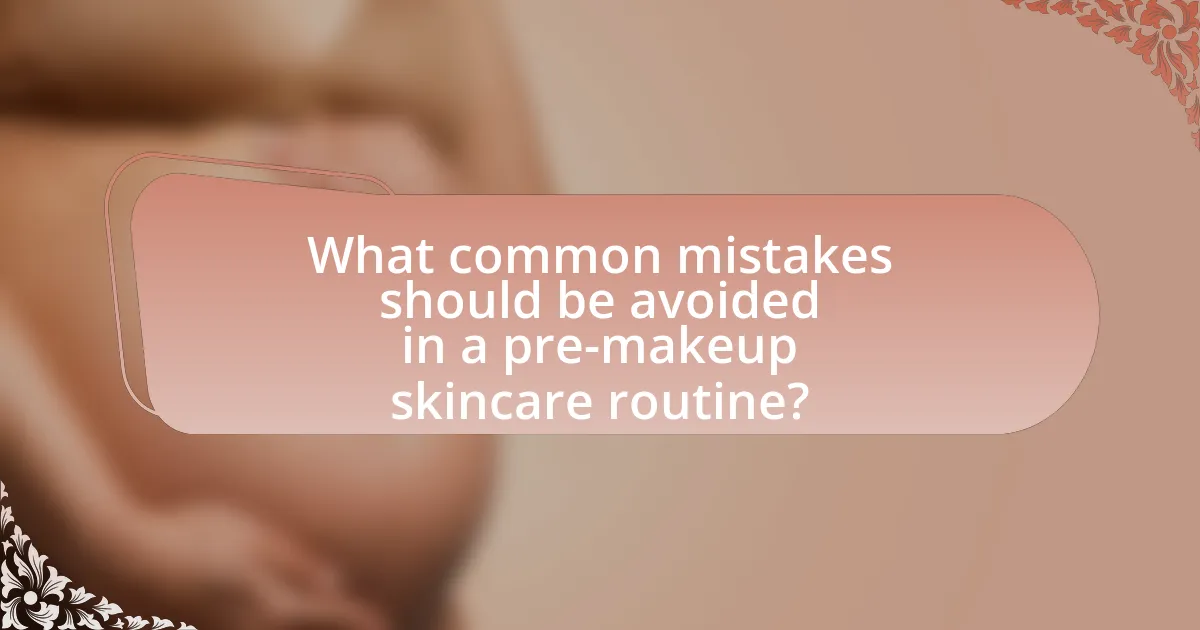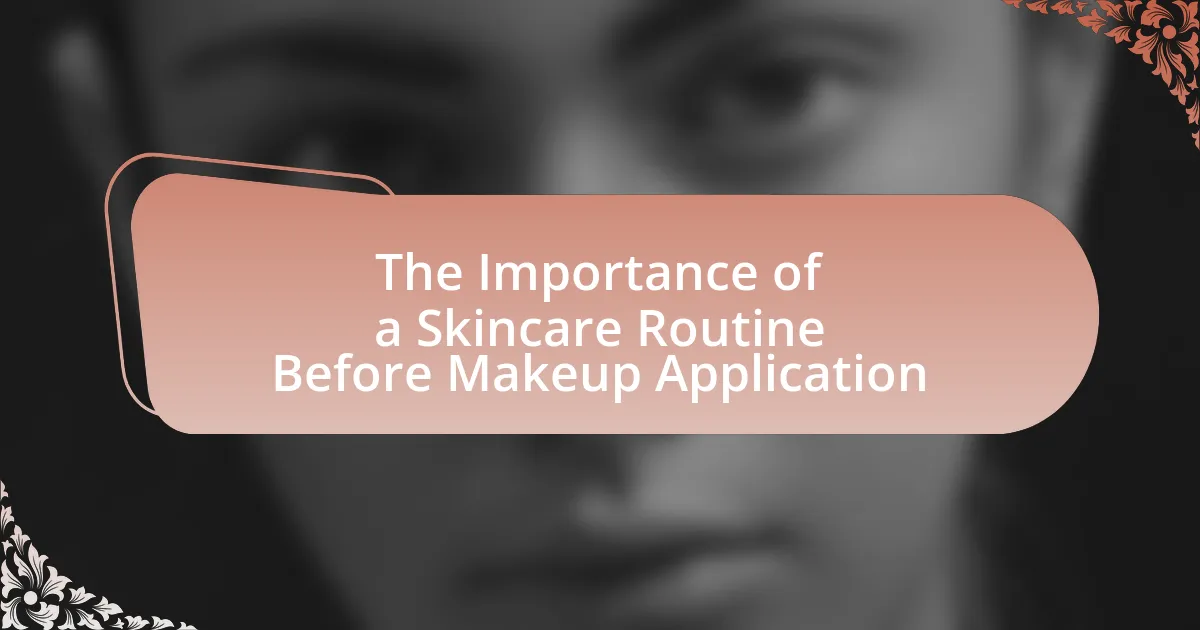The article emphasizes the critical role of a skincare routine before makeup application, highlighting how it creates a smooth and hydrated canvas that enhances makeup performance and longevity. Key benefits include improved skin hydration, texture, and makeup adherence, which collectively contribute to a flawless finish. The article outlines essential steps in a pre-makeup skincare routine, such as cleansing, exfoliating, moisturizing, and applying sunscreen, while also addressing how skin type influences product selection. Additionally, it discusses common mistakes to avoid and best practices for achieving optimal results, ensuring that makeup application is both effective and long-lasting.

Why is a Skincare Routine Essential Before Makeup Application?
A skincare routine is essential before makeup application because it creates a smooth, hydrated canvas that enhances makeup performance and longevity. Proper cleansing removes impurities and excess oils, while moisturizing ensures the skin is adequately hydrated, preventing makeup from clinging to dry patches. Additionally, using products with active ingredients, such as sunscreen or antioxidants, can protect the skin and improve its overall appearance, leading to a more flawless makeup finish. Studies show that well-prepped skin can significantly improve makeup adherence and reduce the need for touch-ups throughout the day.
What are the primary benefits of a skincare routine prior to makeup?
A skincare routine prior to makeup enhances skin hydration, improves texture, and creates a smooth canvas for makeup application. Hydrated skin allows makeup to adhere better and reduces the appearance of fine lines and imperfections. Studies show that well-moisturized skin can improve makeup longevity, as products are less likely to settle into dry patches. Additionally, using products with beneficial ingredients, such as antioxidants and SPF, can protect the skin from environmental damage while promoting overall skin health.
How does skincare enhance makeup longevity?
Skincare enhances makeup longevity by creating a smooth, hydrated base that allows makeup to adhere better to the skin. Proper skincare, including cleansing, moisturizing, and using primers, helps to minimize pores and fine lines, which can otherwise disrupt the makeup application. For instance, a study published in the Journal of Cosmetic Dermatology found that skin hydration significantly improves the wear time of makeup products, as hydrated skin reduces flakiness and uneven texture. This results in a more flawless finish and longer-lasting wear throughout the day.
What role does skincare play in achieving a flawless finish?
Skincare plays a crucial role in achieving a flawless finish by preparing the skin’s surface, enhancing texture, and promoting hydration. Proper skincare routines, including cleansing, exfoliating, and moisturizing, create a smooth canvas that allows makeup to apply evenly and last longer. Studies show that well-hydrated skin can improve makeup adherence and reduce the appearance of fine lines and pores, leading to a more polished look. For instance, a study published in the Journal of Cosmetic Dermatology found that moisturized skin significantly enhances the overall appearance of makeup, confirming the importance of skincare in achieving a flawless finish.
How does skin type influence the skincare routine before makeup?
Skin type significantly influences the skincare routine before makeup application by determining the choice of products and techniques used. For instance, individuals with oily skin benefit from lightweight, oil-free moisturizers and mattifying primers to control shine, while those with dry skin require richer, hydrating products to prevent flakiness and ensure a smooth base. Additionally, sensitive skin types may necessitate fragrance-free and hypoallergenic products to avoid irritation, whereas normal skin can accommodate a wider range of formulations. This tailored approach ensures that the skin is adequately prepared for makeup, enhancing its longevity and appearance.
What specific products should be used for oily skin?
For oily skin, specific products include gel-based cleansers, oil-free moisturizers, and non-comedogenic sunscreens. Gel-based cleansers, such as those containing salicylic acid, effectively remove excess oil and prevent breakouts. Oil-free moisturizers, like those with hyaluronic acid, hydrate the skin without adding extra oil. Non-comedogenic sunscreens, which do not clog pores, are essential for protecting oily skin from UV damage while maintaining a lightweight feel. These products are specifically formulated to address the unique needs of oily skin, ensuring a balanced and healthy complexion.
How can dry skin be effectively prepped for makeup?
To effectively prep dry skin for makeup, start with thorough hydration using a rich moisturizer that contains ingredients like hyaluronic acid or glycerin, which attract moisture to the skin. Following hydration, apply a primer specifically designed for dry skin to create a smooth base and enhance makeup adherence. Studies show that using a hydrating primer can improve makeup longevity and appearance on dry skin. Additionally, exfoliating gently before moisturizing can remove dead skin cells, allowing for better absorption of products and a smoother makeup application.

What steps should be included in a skincare routine before applying makeup?
A skincare routine before applying makeup should include cleansing, toning, moisturizing, and applying sunscreen. Cleansing removes dirt and impurities, ensuring a clean canvas for makeup application. Toning helps to balance the skin’s pH and can tighten pores, enhancing the overall texture. Moisturizing hydrates the skin, preventing dryness and ensuring that makeup applies smoothly. Finally, applying sunscreen protects the skin from UV damage, which is crucial for long-term skin health. These steps are essential for achieving a flawless makeup look and maintaining skin health.
What are the key components of an effective pre-makeup skincare routine?
An effective pre-makeup skincare routine includes cleansing, exfoliating, moisturizing, and applying sunscreen. Cleansing removes dirt and oil, ensuring a clean canvas for makeup application. Exfoliating helps to slough off dead skin cells, promoting a smoother texture. Moisturizing hydrates the skin, preventing dryness and ensuring makeup adheres well. Lastly, applying sunscreen protects the skin from UV damage, which is crucial for maintaining skin health. Studies show that a well-prepared skin surface enhances makeup longevity and appearance, making these components essential for optimal results.
How important is cleansing in the skincare process?
Cleansing is essential in the skincare process as it removes dirt, oil, and impurities from the skin, preparing it for subsequent products. Effective cleansing helps to prevent clogged pores, which can lead to acne and other skin issues. According to a study published in the Journal of Cosmetic Dermatology, proper cleansing can enhance the absorption of active ingredients in skincare products by up to 50%, demonstrating its critical role in maximizing the effectiveness of a skincare routine.
What moisturizing techniques should be employed?
To effectively moisturize the skin before makeup application, employ techniques such as using a hydrating serum, applying a moisturizer suited to your skin type, and incorporating facial oils. Hydrating serums, which often contain hyaluronic acid, can attract moisture to the skin, enhancing hydration levels. A moisturizer tailored to your specific skin type—whether oily, dry, or combination—ensures that the skin barrier is adequately nourished. Additionally, facial oils can lock in moisture and provide a smooth base for makeup. Studies indicate that proper hydration improves makeup adherence and longevity, making these techniques essential for a successful skincare routine prior to makeup application.
How can exfoliation impact makeup application?
Exfoliation significantly enhances makeup application by creating a smoother skin surface. When dead skin cells are removed through exfoliation, the skin’s texture improves, allowing makeup products to adhere better and apply more evenly. Research indicates that smoother skin can lead to a more flawless finish, as uneven textures can cause makeup to cling to dry patches or settle into fine lines. This results in a more polished appearance and longer-lasting makeup wear.
What types of exfoliants are best for pre-makeup use?
Chemical exfoliants, such as alpha hydroxy acids (AHAs) and beta hydroxy acids (BHAs), are best for pre-makeup use. AHAs, like glycolic acid, help to remove dead skin cells and improve skin texture, while BHAs, such as salicylic acid, penetrate deeper into pores to clear out impurities. Studies have shown that using these exfoliants can enhance makeup application by creating a smoother canvas, allowing for better adherence and a more even finish. For instance, a study published in the Journal of Cosmetic Dermatology found that regular use of AHAs improved skin smoothness and radiance, which directly benefits makeup application.
How often should exfoliation occur for optimal results?
Exfoliation should occur 1 to 3 times per week for optimal results. This frequency allows for the removal of dead skin cells without causing irritation or damage to the skin barrier. Research indicates that over-exfoliation can lead to increased sensitivity and dryness, while regular exfoliation promotes cell turnover and enhances the effectiveness of subsequent skincare products.

What common mistakes should be avoided in a pre-makeup skincare routine?
Common mistakes to avoid in a pre-makeup skincare routine include skipping moisturizer, using products that are not suitable for your skin type, and neglecting to exfoliate. Skipping moisturizer can lead to dry skin, which affects makeup application and longevity. Using unsuitable products may cause irritation or breakouts, undermining the effectiveness of makeup. Neglecting exfoliation can result in uneven texture, making makeup appear patchy. These practices are supported by dermatological advice emphasizing the need for hydration, appropriate product selection, and regular exfoliation to achieve a smooth canvas for makeup application.
What are the pitfalls of using the wrong products?
Using the wrong products can lead to skin irritation, breakouts, and compromised skin health. For instance, using a product that is not suitable for one’s skin type can disrupt the skin’s natural barrier, resulting in increased sensitivity or acne. According to a study published in the Journal of Dermatological Treatment, 60% of individuals reported adverse reactions when using products not formulated for their specific skin concerns. Additionally, incorrect product combinations can cause pH imbalance, leading to further skin issues.
How can over-exfoliation affect makeup application?
Over-exfoliation can lead to a compromised skin barrier, resulting in dryness, irritation, and increased sensitivity, which negatively impacts makeup application. When the skin is over-exfoliated, it may become flaky or uneven, causing makeup to cling to dry patches or settle into fine lines. This can result in a patchy or cakey appearance, making it difficult to achieve a smooth finish. Additionally, sensitive skin may react poorly to makeup products, leading to redness or breakouts, further complicating the application process.
What signs indicate that a skincare product is not suitable?
Signs that indicate a skincare product is not suitable include irritation, redness, or breakouts after application. These reactions suggest that the product may contain ingredients that are incompatible with your skin type or sensitivities. For instance, if a product causes stinging or burning sensations, it likely contains irritants or allergens. Additionally, if the skin becomes excessively oily or dry, it indicates that the formulation does not match the skin’s needs. Research shows that 50% of individuals experience adverse reactions to skincare products, highlighting the importance of patch testing and ingredient awareness.
How can one troubleshoot skincare issues before makeup application?
To troubleshoot skincare issues before makeup application, one should first identify specific skin concerns such as dryness, oiliness, or irritation. For instance, if the skin appears flaky, applying a hydrating moisturizer can alleviate dryness, as studies show that well-hydrated skin enhances makeup application and longevity. If the skin is excessively oily, using a mattifying primer can help control shine, supported by research indicating that primers can improve makeup adherence and reduce oiliness. Additionally, conducting a patch test for new products can prevent adverse reactions, ensuring that the skin remains healthy and ready for makeup.
What steps can be taken if makeup does not adhere properly?
To ensure makeup adheres properly, start by preparing the skin with a suitable skincare routine that includes cleansing, exfoliating, and moisturizing. Cleansing removes dirt and oil, exfoliating eliminates dead skin cells, and moisturizing hydrates the skin, creating a smooth canvas for makeup application. Additionally, using a primer can enhance makeup adherence by filling in pores and fine lines, providing a better surface for foundation. According to dermatological studies, a well-prepped skin surface can improve makeup longevity and appearance, as it allows products to grip better and reduces the risk of separation or patchiness.
How can skin irritation be managed before applying makeup?
Skin irritation can be managed before applying makeup by using a gentle skincare routine that includes cleansing, moisturizing, and applying soothing products. Cleansing removes impurities and excess oils that can exacerbate irritation, while moisturizing helps to hydrate and protect the skin barrier. Soothing products, such as those containing aloe vera or chamomile, can reduce redness and inflammation. Studies indicate that a consistent skincare routine can significantly improve skin health and reduce irritation, making makeup application smoother and more comfortable.
What are the best practices for a skincare routine before makeup application?
The best practices for a skincare routine before makeup application include cleansing, exfoliating, moisturizing, and applying sunscreen. Cleansing removes dirt and oil, ensuring a clean canvas for makeup. Exfoliating, done 1-2 times a week, helps to slough off dead skin cells, promoting smoother skin texture. Moisturizing hydrates the skin, preventing makeup from settling into fine lines, while sunscreen protects against UV damage, which is crucial for maintaining skin health. According to the American Academy of Dermatology, using sunscreen daily can significantly reduce the risk of skin cancer and premature aging.


